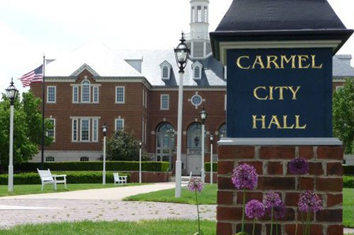Subscriber Benefit
As a subscriber you can listen to articles at work, in the car, or while you work out. Subscribe NowThe city of Carmel filed legal action this week against three state financial agencies over a law that diverts local income tax revenue from Carmel to Fishers.
According to the complaint filed Monday in Marion Superior Court No. 5, the city alleges the law harms Carmel by depriving it of tens of millions of dollars in local income tax revenue that it would otherwise receive.
The lawsuit says House Enrolled Act 1454, signed by Gov. Eric Holcomb on May 4, is unconstitutional and the three state agencies should be prohibited from enforcing it. The law went into effect July 1.
The lawsuit names the commissioners of the Indiana Department of Revenue, Indiana Department of Local Government Finance and Office of the Indiana State Auditor (now State Comptroller) as defendants.
The complaint says the defendants are named in the lawsuit because they have a role in carrying out the collection, allocation and distribution of local income taxes to civil taxing units.
A Carmel spokesperson declined to comment on the litigation, and a spokesperson for the Department of Local Government Finance said the department does comment on pending litigation. A Fishers spokesperson also said the city has no comment about the complaint, while a spokesperson for the Office of the State Comptroller also could not comment as the office is doing research on the matter to learn details.
IBJ did not immediately receive response from a representative of the Indiana Department of Revenue.
House Bill 1113, passed by the Indiana Legislature in 2020, limited Carmel to a 2.5 percent increase in annual income tax growth for three years and diverted excess funds to Fishers.
The legislation’s goal was to account for a quirk in the way income taxes are distributed so the revenue more accurately reflects the cities’ increasingly similar populations and median household incomes.
The law was set to expire at the end of this year. However, legislators this year passed HEA 1454, which extended the law through 2026.
Local income tax revenue distributions are typically placed in a pot and distributed to local governments in accordance with a state-mandated formula, one that considers each community’s property tax levy and the amount of income taxes the city received the previous year.
Under the original legislation, the state capped the year-over-year growth of Carmel’s tax revenue allocation at 2.5% from 2021 through 2023.
The lawsuit says that, before the law, Carmel historically received about 42% of income taxes collected and distributed to cities in Hamilton County while having 34% of the county’s population. Fishers received 23% of income taxes while having 32% of Hamilton County’s population.
The complaint says Carmel lost $16.7 million to Fishers after House Bill 1113 was enacted, rather than the estimated $10.2 million. It also estimates Carmel stands to lose more than $39 million through 2026 because of the extension.
The lawsuit claims HEA 1454 punishes Carmel for taking on the risk of building additional “costly infrastructure that others, including Fishers, chose to not invest in.”
It adds that Carmel invested millions of dollars in infrastructure by issuing bonds in reliance on the general local income tax allocation formula and attracted a greater amount of assessed value in the form of office buildings and corporate headquarters.
“Carmel likewise took risks that Fishers did not in building large commercial office parks, spending hundreds of millions of dollars in infrastructure for highways and streets, sidewalks, water and sanitary sewer infrastructure, storm water infrastructure, streetlights, etc., as well as the staffing and facilities necessary to support robust police and fire patrols and emergency medical services,” the complaint says.
Please enable JavaScript to view this content.


Carmel needs to tighten their purse strings…
Pretty clear that Carmel made risky choices.
Population and median income are not the best way to look at this. Carmel has many more high income people than Fishers. According to the Census Bureau’s American Community Survey for 2019, Carmel had $6.3 billion in total personal income and Fishers had $4.8 billion. That’s just a rough measure, but the right way to do it would be to allocate tax distributions based on the actual incomes of people in the various cities. It’s trivial to geocode addresses today.
By the way, this is yet another piece of special anti-Carmel legislation passed by the state, simply taking $57 million away from Carmel and giving it to someone else. There’s probably been as much or more anti-Carmel legislation out of the General Assembly than anti-Indianapolis laws. But Indianapolis also benefits from enormous special purpose legislation designed to benefit it – like the new law allowing the city to create a downtown taxing district without voter approval – whereas Carmel gets nothing special from the state.
You would think that if the Republicans who run Indiana government wanted the state to prosper, they would look around and see what is working, and do more of that. Instead, they see a place like Carmel that’s made wise decisions, built a world class community, and is doing very well – and decided to punish them instead. The state prefers that communities pursue the more minimalist approach to Fishers, so that what’s they reward. This is an message from the state about what they want to see and not see.
Carmel shows a GOP model based on common sense centrism and public investment that is a standing rebuke to state government and the model it as pursued. Of course they don’t like Carmel, because it shows that our state didn’t have to pursue the course that it did. Carmel is the road not traveled for the Indiana GOP.